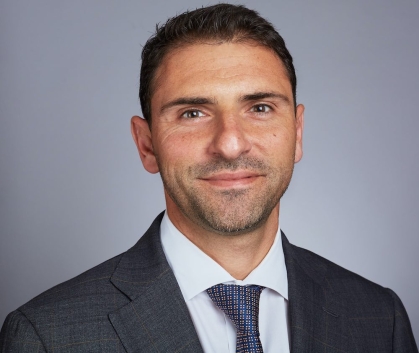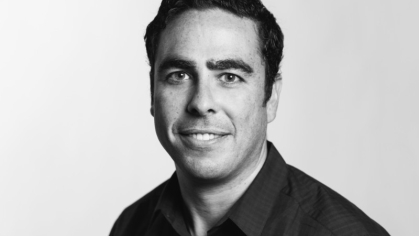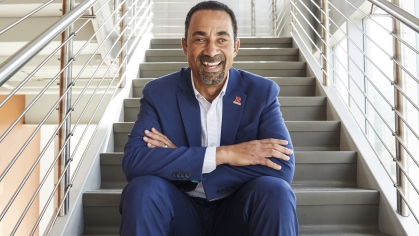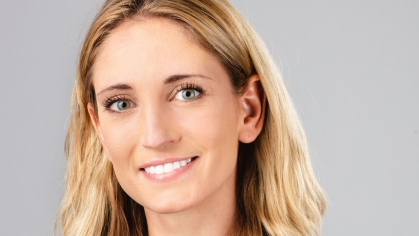“Studying a science or engineering is not the easiest path and takes time, effort, and hard work. But it gives you an incredible foundation for problem-solving.” – Paul Segal

After graduating in 1997 from the School of Engineering with a BS in chemical engineering, Paul Segal began working with Smith Barney’s mergers and acquisitions group. In 2002, he founded hedge fund Luminus Management, serving as president and portfolio manager until 2011, when he joined LS Power – one of the nation’s largest independent power and transmission developers – as CEO, a position he holds today. Together with his wife Jenna, he recently established the Paul and Jenna Segal Family Foundation Renewable Energy Initiatives Fund with a $500,000 gift. The Segal Fund supports renewables and storage educational initiatives, such as Rutgers’ Offshore Wind Initiative, as well as undergraduate fellowships and capstone project support for juniors and seniors.
Where did you grow up?
I was born in Ukraine, but we moved to this country, first to St. Louis, and then to North Brunswick in my first year of middle school.
Why Rutgers?
It was the most affordable option, and it was going to give me everything I needed educationally.
What drew you to chemical engineering?
While I considered a few different paths, at the time, Rutgers sat at the center of the biotechnology, pharmaceuticals, and petrochemical process industries.
Starting the summer after my freshman year, I had the benefit of working at J&J. This exposed me to the inside of facilities and reinforced the path I was on at the time.
What led you to begin your career at Smith Barney?
I’d always had an interest in business and finance. Even though I’d had relatively little background in it outside of reading books and the Wall Street Journal, I didn’t feel intimidated about the learning curve at Smith Barney having studied chemical engineering.
What prompted your move to LS Power?
LS Power was founded by my father, and it was a small company with fewer than 30 employees when I joined. I’d always had a tremendous amount of respect for what my dad had accomplished.
This was a unique opportunity for me. I’d experienced a phenomenal learning curve from engineering to finance, but I knew I could learn more if I worked for him.
How has LS Power developed your interest in energy sustainability and resilience?
I’ve been working in this space with a focus from day one at LS Power in building the most efficient, cleanest electric generation assets possible.
The more I got to know how this worked, it became clear that going down the road of decarbonizing energy system creates a tremendous number of new business opportunities.
Beyond that, it also creates a huge need for trained people with technology backgrounds able to do a host of things, from interconnecting new power projects into the rest of the electric grid infrastructure to putting regulations in place for new business models.
Has anything changed in your years with LS Power?
For nearly the first 20 years of my work in the energy sector, it was a quiet sleepy place, but over the past five or so years, it’s switched gears. There are more opportunities, a great need for capital, and people with the intellectual capacity to execute an energy transition. It’s become a whole lot more interesting.
What led to your establishing the Paul and Jenna Segal Family Foundation Renewable Energy Initiatives Fund?
I’ve wanted to give back to the school for a while, and I was looking for an opportunity I felt passionate about.
Jenna and I both recognize the unmet need to develop people who can bring real problem-solving skills to bear on the energy transition. I believe if we can get Rutgers to lead, train, and develop students who can help us get through to the other side of the energy transition, it would be a powerful way to help – and impact many students. I think young people today have a very real interest in clean energy systems.
There’s also huge opportunity. New Jersey Governor Murphy’s recent executive order accelerates the state’s path to decarbonization by 2035. The state has strong ambitions to lead in this area, whether land-based, solar, off-shore wind, or vehicle electrification.
Why do you believe that Rutgers will be a leader in meeting decarbonization goals?
All the building blocks are there, and Rutgers is doing many good things to support the state’s ambitious decarbonization targets. Jenna and I wanted to take steps to help catalyze doing it faster, scaling it faster, encouraging it faster, and encouraging other people, and other corporations to join along. There’s a need and opportunity for intellectual capital in our state – and we need to support this with capable, dedicated professionals.
What do you hope the RU wind initiative can accomplish in terms of climate resiliency?
For me, it’s about investing in developing people and a workforce to commercialize and scale the many technologies that are already out there, but that we haven’t been able to fully deploy.
What do you most value about your Rutgers engineering education?
So many engineering disciplines teach you the same thing – how to solve complicated problems. Rutgers engineering really did prepare me for the real world, and a broad set of professional opportunities. Getting a job wasn’t the question, rather the question was what I wanted to do. I had a lot of opportunities, which I attribute to the educational content delivered to me at Rutgers and the opportunities to have some professional experience while I was in college.
When you take part in the National Engineers Week Engineering Sustainability and Resilience conversation what did you highlight?
Given the primarily student audience, I wanted to highlight the need and opportunities for kids coming out of college with professional degrees. Truly this sector needs all sorts of people. There are jobs in government relations, regulatory and communications jobs, and jobs in construction. The scope of opportunity is huge and can be a fit for all kinds of majors.
Do you see yourself as a mentor?
We’re starting our first internship program in NYC this year and I’m hopeful in the future we can include Rutgers in that process.
What advice would you give today’s students?
Studying a science or engineering is not the easiest path and takes time, effort, and hard work. But it gives you an incredible foundation for problem-solving. One thing I didn’t take enough advantage of was to spend more time with professors and grad students in labs that can provide a tremendous opportunity to learn and do – but I was lucky enough to have a version of that in the corporate world.


